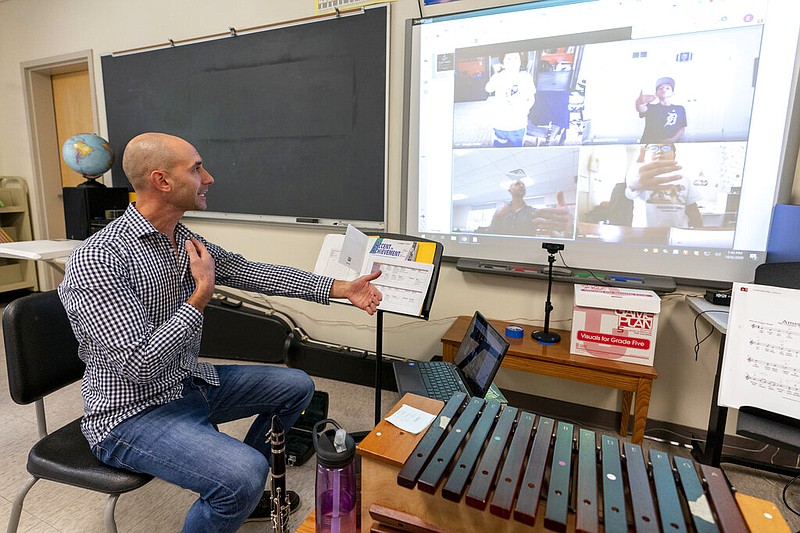The use of online, remote instruction that has become fairly widespread in this covid-19 pandemic school year is here to stay -- but with guidance and parameters, state education leaders proposed Thursday.
In response, the Arkansas Board of Education authorized staff at the state's Division of Elementary and Secondary Education to establish an application process for use by school districts that want to offer the parents and students in their districts a digital learning option.
Deputy Education Commissioner Ivy Pfeffer said digital instruction and learning are the future of education.
"It's an opportunity for districts to be able to expand on what they are doing now," Pfeffer said about the application process. "I do think this is the best way to move forward to meet the needs of students."
Interested school districts must submit their digital learning option applications by May 1 for implementation in the upcoming 2021-22 school year.
The application process would require a district to receive from the state Education Board waivers of state rules and laws that apply to traditional schools but would hinder a digital learning option. Such waivers of state education rules and laws are allowed by state law, Act 1240 of 2015, on a case-by-case basis.
[CORONAVIRUS: Click here for our complete coverage » arkansasonline.com/coronavirus]
The district programs would not constitute new schools within a district but be part of existing schools.
School districts across the state were all but thrown into the use of online teaching and learning in the weeks and months after Gov. Asa Hutchinson last March closed the state's schools to on-site instruction as a way to limit the global spread of contagious and potentially fatal covid-19, a disease caused by the coronavirus.
Students and teachers continued with teaching and learning for the remainder of the last school year using computer technology, if possible, and paper packets of lessons, if not. All schools reopened for on-site instruction to the state's more than 470,000 students in late August but with the directive that schools must be ready to pivot their students and teachers to remote and online teaching and learning in the event of a covid outbreak in their schools.
School districts were not required by the state to offer a full-time online instructional program this current school year but many are doing so in response to parent concerns about the spread of covid, Arkansas Education Commissioner Johnny Key told the Education Board on Thursday.
Almost 21% of the state's public school students are learning online -- more than 97,000 students, according to data from the state education agency.
Another 60,000 Arkansas students are using a hybrid instructional program in which they learn online from their homes a few days a week and go to school on site the remaining days. Better than 313,000 students are on-site learners this year -- about 66%.
The draft application for interested districts to submit to be approved for an online instructional program is five pages. The districts will be asked to specify the waivers they need from state laws and rules such as those that set class size and teacher to student ratios, the length of the instructional day and whether recess will be provided.
The districts will have to describe how students and teachers will interact -- be it live instruction or recorded instruction to be viewed by the student at a convenient time. The districts will be asked about teacher job assignments -- whether teachers will have to teach remote, online students only or in-person students only or both types of students simultaneously.
The application has questions about technology and curriculum resources that will be available to students, how students will participate in state required testing programs and what supports will be provided to students in terms of special education, gifted education and help for students who are not native English speakers.
Policies for student attendance, discipline and grading of student work must be provided with the application.
A district will have to show evidence of public input on the digital learning plan and local School Board approval.
Pfeffer said that a guidebook will be made available to the districts on digital learning that will, in part, define the terms related to online learning. She told the Education Board that the state will call on the state's 15 educational cooperatives to aid the districts in refining their applications.
Pfeffer also said that the digital learning option provided by a district will be different than Alternative Methods of Instruction or AMI days in which students and teachers work from home when inclement weather or a utility problem makes it necessary to close a school for a small number of days.
Education Board member Sarah Moore of Stuttgart asked for assurances of innovation in the digital learning programs. She also expressed concerns about the use of recorded, asynchronous lessons for students in elementary and middle schools. And she said she had concerns about requiring teachers to teach both virtual and in-person students.
Joel Lookadoo, the state's Teacher of the Year and an ex officio Education Board member, urged that school districts specify the teacher-to-student ratios and class sizes on the application.
Pfeffer assured the board that the state will monitor the online programs in schools and that waivers awarded to ineffective programs can be revoked by the Education Board.
Education Board member Adrienne Woods of Bentonville questioned whether legislation could be developed so that Education Board waivers would not be necessary for the digital options. Pfeffer and Key cautioned that once a digital instructional program becomes legally mandated, supplemental federal funding becomes limited.
